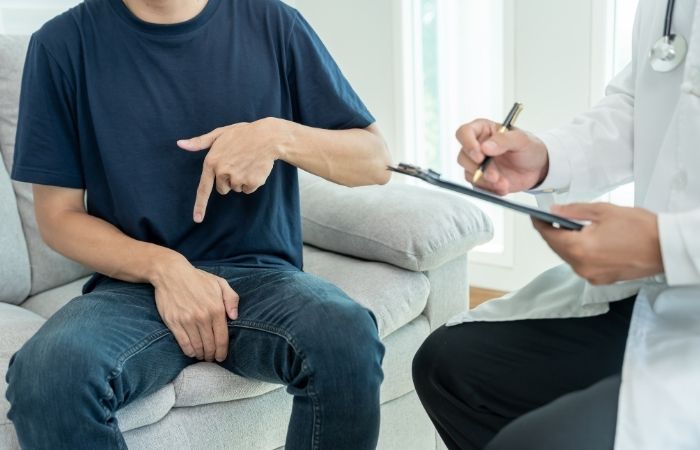Quick Answer: Many men don’t admit they have an STD due to stigma, fear of rejection, lack of symptoms, and cultural norms about masculinity. Silent infections like chlamydia and herpes often go unspoken because men feel it makes them “less manly” or sexually undesirable. But untreated STDs don’t just hurt you, they hurt your partners too. Honest disclosure is power, not shame.
The Myth of Invincibility
From childhood, many boys are taught to “suck it up,” “tough it out,” and never admit weakness. This conditioning follows them into adulthood, and right into their sex lives. When STDs show up, it’s not just a health issue, it’s a threat to their identity.
“Real men” aren’t supposed to get sick. Especially not from sex. Especially not from something that feels dirty or taboo. So instead of seeking help, many men downplay symptoms, delay testing, or stay silent altogether.

People are also reading: How Long Do Oral STDs Last in the Throat? What Science and Survivors Say
No Symptoms, No Problem? Not Quite
STDs like chlamydia, gonorrhea, and herpes can be totally asymptomatic, especially in men. This gives many guys the perfect excuse to ignore them.
“If it didn’t burn, it must be fine.”
“If I didn’t feel sick, it must’ve been a false alarm.”
This logic allows infections to spread, often for months, before anyone knows what’s going on. Silence becomes a shield and a time bomb.
Masculinity and Sexual Performance Pressure
For many men, sex isn’t just intimacy, it’s performance. It’s power. It’s validation. So when an STD enters the picture, it doesn’t feel like “a medical condition.”
It feels like a threat to their sexual identity. Like their body is broken. Like their desirability just got downgraded.
This shame fuels secrecy. If admitting you have an STD feels like confessing you’re no longer “a man,” many guys won’t speak up, no matter who gets hurt.
Hookup Culture Rewards Silence
In casual sex environments, being “low-maintenance” often wins. Disclosing an STD can feel like too much information, or too risky for someone who’s just looking for one night.
So many men think:
- “Why bring it up if it’ll scare them off?”
- “I’ll just be extra careful and use a condom.”
- “They didn’t ask, so I don’t have to tell.”
But condoms don’t protect against all STDs, and silence isn’t consent. When disclosure feels like social suicide, men stay quiet, and infection spreads.
Check Your STD Status in Minutes
Test at Home with RemediumChlamydia & Gonorrhea Test

 For Men & Women
For Men & Women Results in Minutes
Results in Minutes No Lab Needed
No Lab Needed Private & Discreet
Private & DiscreetOrder Now $49.00 $98.00
For all 2 tests
Fear of Rejection or Judgment
Even in long-term relationships, the fear of disclosure can be paralyzing. Many men believe:
- They’ll be accused of cheating
- They’ll lose their partner’s trust forever
- They’ll be seen as dirty, reckless, or dangerous
So they wait. They “plan to tell later.” They hope the meds kick in fast enough that no one notices.
But that fear, while understandable, can cost someone else their health. Silence doesn’t protect the relationship, it poisons it.
Confusion and Misinformation
Let’s be real: many men simply don’t know what an STD looks like, or how transmission really works. They assume herpes means obvious sores. They think oral sex is always safe. They believe antibiotics from a buddy will clear things up.
Without clear, non-judgmental education, men don’t just stay silent, they stay dangerously unaware.
This isn’t just ignorance. It’s a systemic failure to teach sexual health in a way that reaches real people, especially men.
Lack of Male-Centered Health Messaging
Walk into most STD clinics and you’ll see posters about pregnancy, periods, pap smears, and “ladies, know your status.”
Men often don’t see themselves reflected in sexual health outreach, unless they’re gay or transgender. Straight men, especially, are rarely spoken to directly. That invisibility becomes another reason to stay silent. If the system doesn’t talk to them, why should they talk back?
Men Fear the Health System Will Shame Them
Even if a man gets up the nerve to go to a clinic, he may still be met with cold stares, rushed exams, or invasive questions. Some healthcare providers, consciously or not, shame male patients, especially those with STDs.
We’ve heard it all:
- “Why didn’t you come in sooner?”
- “You really should know better.”
- “How many partners do you have, exactly?”
Men who already feel fragile walk away from care they desperately need. And many never return. The result? Silent infections. Avoidance. A cycle of shame.

People are also reading: Housing Insecurity and Sexual Health
Gay and Bi Men Face Double the Judgment
Queer men live at the intersection of sexual stigma and homophobia. When they contract an STD, it’s not just a health issue, it becomes a moral indictment in the eyes of society.
Some are told they’re “asking for it.” Others fear being outed if they disclose. Many navigate hookup culture without support or affirming care, especially in rural or conservative areas.
Even within LGBTQ+ spaces, STD stigma still lingers. And for gay and bi men, admitting an infection can trigger internalized shame, fear of rejection, or trauma from past judgment.
Men Are Taught to Handle Things “Privately”
Privacy sounds good, until it becomes isolation. Many men are taught from an early age to deal with emotions, pain, and mistakes on their own. So when an STD shows up, the instinct is to handle it solo:
- Buy antibiotics online
- Self-diagnose with Google
- Ghost partners instead of talking
This "do-it-yourself" way of thinking is a trap. It makes treatment take longer, stops people from talking to each other, and puts other people in danger. But to unlearn this, we need new ideas about what it means to be a man, ones where being vulnerable isn't a sign of weakness.
Some Don’t Know If or When They Should Disclose
What if it’s dormant? What if it’s treatable? What if it’s oral herpes and they don’t have an outbreak?
STD disclosure isn’t black and white. Many men feel confused about:
- When they’re infectious
- What counts as “active” or “cleared”
- If someone deserves to know after just a hookup
Without clear ethical and medical guidance, some default to silence, not out of malice, but confusion. We need honest, nuanced conversations that reflect real situations, not just textbook advice.
The Impact of Porn and Misinformation
Porn doesn’t show condoms. It doesn’t show symptoms. It doesn’t show awkward conversations, follow-ups, or fear.
For many men, especially young ones, porn becomes the only sexual education they ever get. And that education leaves out risk, responsibility, and real communication.
Without a counterbalance, men are left unprepared for the reality of STDs. They’ve seen the fantasy, now they’re ashamed of the truth.
Check Your STD Status in Minutes
Test at Home with Remedium7-in-1 STD Test Kit

 For Men & Women
For Men & Women Results in Minutes
Results in Minutes No Lab Needed
No Lab Needed Private & Discreet
Private & DiscreetOrder Now $129.00 $343.00
For all 7 tests
Men Don’t Always Know How to Bring It Up
Even men who want to disclose their STD status often don’t know how. The language feels clunky. The fear of being misunderstood is real. And no one ever taught them how to talk about it.
So they delay. They choke. They hope it “won’t come up.” But disclosure isn’t about perfection, it’s about honesty.
Scripts, roleplays, and harm-reduction messaging can help. We just have to teach them.
Shame Doesn’t Stop Infections, It Spreads Them
Here’s the truth that too few people say out loud: Men who don’t disclose aren’t monsters. They’re scared. They’re ashamed. They’ve been taught that admitting an STD makes them less of a man, less desirable, less human.
But shame doesn’t protect partners. It doesn’t promote safety. It doesn’t end stigma. It just buries infections deeper, and leaves people more alone.
The solution isn’t tougher laws or louder judgment. It’s compassion, access, and truth-telling that meets men where they are.
When the STD Isn’t Curable, the Silence Gets Louder
For infections like herpes and HIV, disclosure becomes even harder. There’s no “I took antibiotics, it’s gone” conversation. Instead, men have to explain chronic conditions, and risk being permanently labeled or rejected.
This makes people feel scared. People who are honest can still stop talking after a painful reaction. Stigma grows, especially when there is no cure for the disease.
But with education and support, men can learn that managing a lifelong STD isn’t a failure, it’s an act of responsibility and care.
Disclosure Can Improve Relationships (Yes, Really)
We hear a lot about the breakups, the ghosting, the “You gave me WHAT?” moments. But disclosure isn’t always a disaster. In fact, for many couples, it builds trust.
“He told me before we ever hooked up. I didn’t run, I respected him more.”
“We tested together. It actually made us closer.”
“She’d had herpes too. I wasn’t alone anymore.”
When men share honestly, they often find support, relief, and new ways to connect. But first, they have to believe it’s possible.

People are also looking for: Oral Trichomoniasis Exists, But Most People Miss the Signs
Why Some Men Only Confess After Getting Caught
It’s a painful pattern. A woman gets tested. She tests positive. She tells her partner. Only then does he admit he “had something” and thought it wasn’t a big deal.
A lot of men wait until they have to tell the truth because they are afraid of confrontation, not because they don't care. But this pattern breaks trust, causes trauma, and makes infections that can be treated into emotional landmines.
We need to make it normal to talk about things early, take the initiative, and share responsibility. Not just "I guess I should have told you," but "Here's what you need to know."
Solutions That Help Men Speak Up
So what actually helps? Here’s what survivors, therapists, and public health workers say:
- Male-friendly testing environments with clear signage and privacy
- Discreet at-home testing to reduce shame around clinics
- Harm-reduction scripts for disclosing to partners
- Peer-led education about STDs and masculinity
- Online communities where men can talk anonymously
Disclosure doesn’t have to be perfect. It just has to be honest, timely, and grounded in care.
Why At-Home Testing Is Changing the Game
One of the biggest barriers to STD disclosure is not knowing your status at all. Clinics can feel judgmental, far away, or hard to access. But now, men can test on their own terms.
STD Rapid Test Kits offer discreet, accurate testing that includes results within days, and full privacy.
- No awkward questions
- No waiting rooms
- No insurance required
For many men, knowing quietly is the first step toward speaking loudly. And these kits make that step possible.
Check Your STD Status in Minutes
Test at Home with Remedium3-in-1 STD Test Kit

 For Men & Women
For Men & Women Results in Minutes
Results in Minutes No Lab Needed
No Lab Needed Private & Discreet
Private & DiscreetOrder Now $69.00 $147.00
For all 3 tests
Ending the Silence Isn’t Just About Him, It’s About Everyone
This isn’t a “men’s problem.” It’s a public health problem. When men stay silent, partners suffer. Outbreaks grow. Trust breaks down. And communities carry infections in the dark.
Ending that silence means listening without judgment. Educating without shame. Offering tools that make honesty safer than secrecy.
And reminding every man: Having an STD doesn’t make you a monster. Hiding it doesn’t make it go away. But telling the truth, that makes you brave.
What If He’s Still in Denial?
Denial isn’t just avoidance, it’s protection. For some men, acknowledging an STD means confronting past choices, partner betrayal, or a break in their identity.
It’s not uncommon to hear:
- “There’s no way it came from me.”
- “I feel fine, it must be a mistake.”
- “That test isn’t accurate.”
But denial doesn’t delay the damage. It only delays the healing. Support, not shame, is what helps men move through denial and into accountability.
What If You’re the One He Infected?
You have the right to feel hurt, angry, or scared if you find out you have an STD and your male partner never told you. You should get medical care, emotional support, and clear information.
It might help to confront him, or it might not. But you don't need him to say he's sorry for you to heal. Put your health, treatment, and boundaries first. And know that this wasn't your fault.
Is Shame Gendered?
Everyone experiences STD shame, but the type of shame varies. For women, it’s often framed as “dirty, slutty, irresponsible.” For men, it’s “weak, careless, failed.”
In both cases, shame drives silence and stigma. But for men, especially those conditioned to avoid vulnerability, the pressure to “man up” becomes a muzzle.
We can’t fight STD stigma without understanding how it lands differently for each gender. The solutions must be just as nuanced.
The Future: What Honest Men Look Like
Imagine a world where men get tested without fear. Where they say, “I care about your health and mine, so here’s what I know.” Where telling the truth isn’t humiliating, it’s hot, safe, and normal.
That future is possible. It starts with one man, one test, one conversation.
If you’ve been silent, you’re not too late. If you’ve been scared, you’re not weak. If you’ve been ashamed, you’re not broken.
You're human. You’re learning. And you’re ready to step forward with honesty and care.

People are also reading: When the Condom Breaks: What to Do in the First 48 Hours
FAQs
1. Why don't guys talk about their STDs?
Because of shame, fear of rejection, cultural norms about masculinity and silence, and other things.
2. Is it against the law to not tell your partner you have an STD?
Yes, in some places, especially when it comes to HIV. But even if it's legal, it's still about protecting your partner's right to say yes and stay safe.
3. Is it possible to have an STD and not show any symptoms?
Of course. A lot of men have infections that don't show any signs, like chlamydia and herpes. That's why it's important to get tested regularly.
4. What would happen if I told my partner and they left?
That hurts, but it doesn't mean you did anything wrong. You were honest with them because you cared about them, and you'll find someone who cares about you too.
5. Do guys really talk to each other about STDs?
Not often, but that's starting to change. Online communities and sex-positive groups are making it easier for men to talk to other men.
6. Can I get care even if I don't have insurance?
Yes. A lot of clinics offer free or sliding scale care. You can also get at-home test kits without insurance.
7. What if I got antibiotics from a friend?
Not a good idea. You might not be treating the right infection or getting rid of it completely. Always test first and do what your provider says.
8. If I don't tell my partner, will condoms keep them safe?
Not completely. Condoms lower the risk, but they don't stop all STDs, especially herpes and HPV.
9. What's a good way to get the conversation going?
"I want to be honest with you" is a good way to start. I have [infection] and I care enough to tell you before we go any further.
10. Can tests I do at home help me decide before I tell someone?
Yes. They are private, quick, and accurate, which makes them a great first step if you are unsure or scared about going to a clinic.
When Silence Breaks, Healing Starts
We live in a culture that trains men to be silent about pain, especially when it’s sexual. But silence won’t protect your health, your partners, or your peace of mind.
STDs aren’t a moral failing. They’re a part of being sexually active. And disclosing one doesn’t mean you’re dirty, reckless, or broken, it means you’re accountable, human, and still worthy of love.
If you're a man struggling to say the words, “I tested positive,” just know this: You're not alone. And your honesty could change everything, for you, and for the person you care about.
Sources
1. PMC – Relationships Between Perceived STD‑Related Stigma, STD‑Related Shame, and Testing Behaviors
2. PMC – Stigma Associated with STIs Among Indian Clinic Patients
3. MDPI – Shame and STIs: Disclosure Barriers Among Emerging Adults
4. PLOS ONE – Role of Stigma in HIV Acceptance & Disclosure Among MSM
5. SCIENTIFIC REPORTS – Sexual Stigma and Disclosure Patterns in Men Who Have Sex With Men










